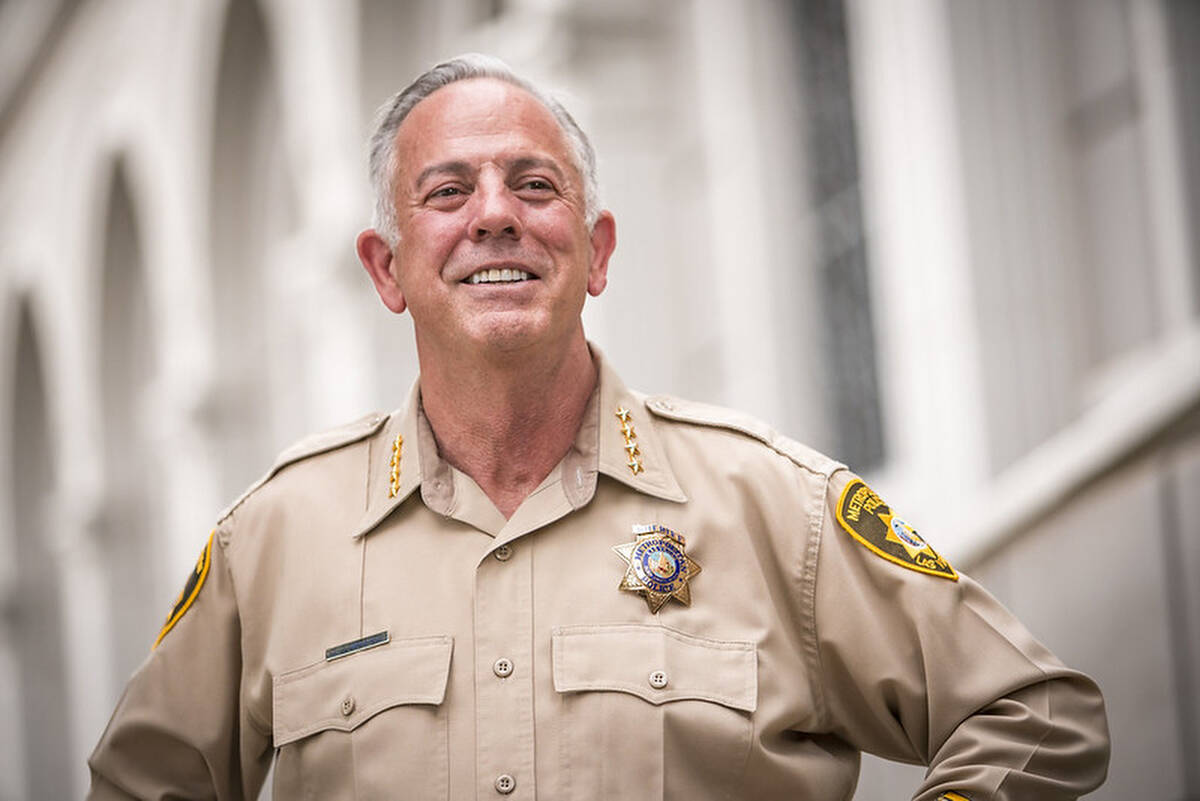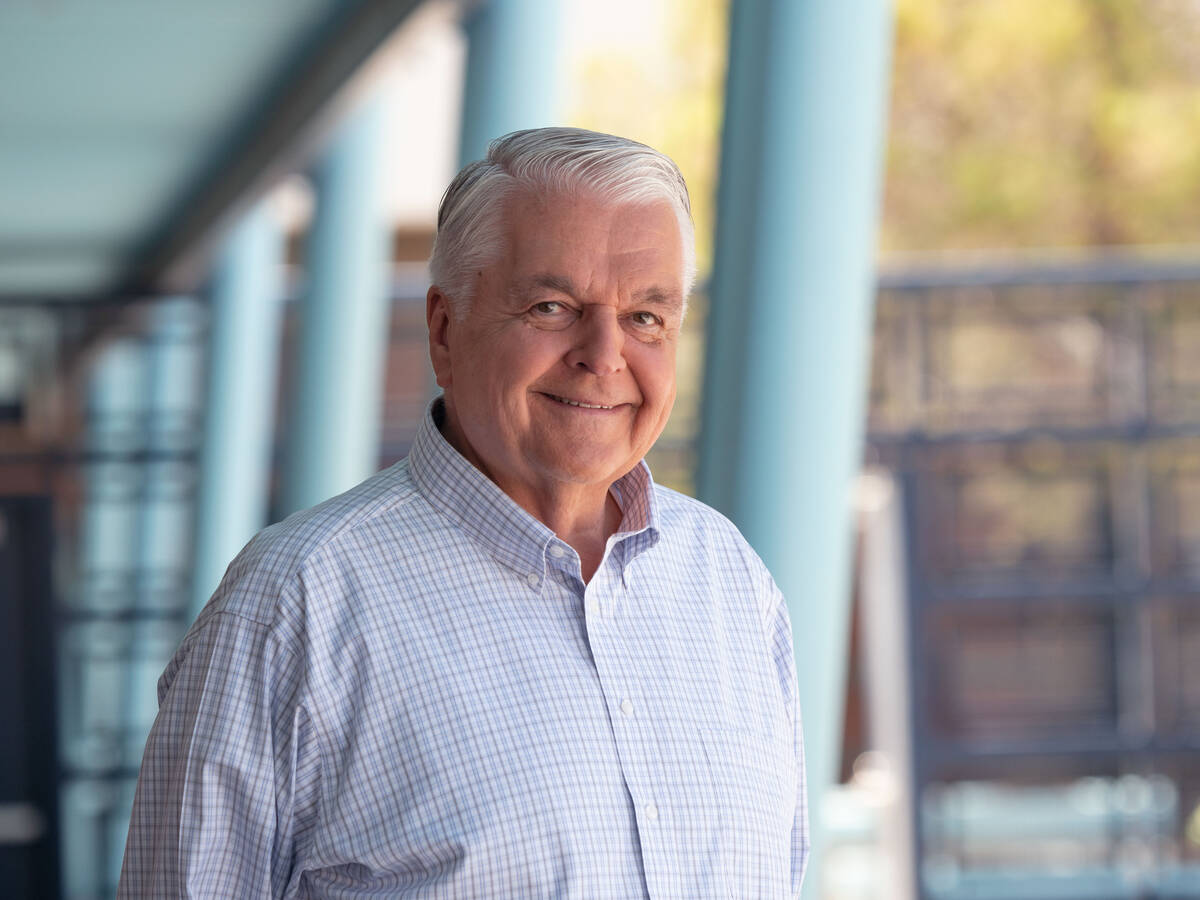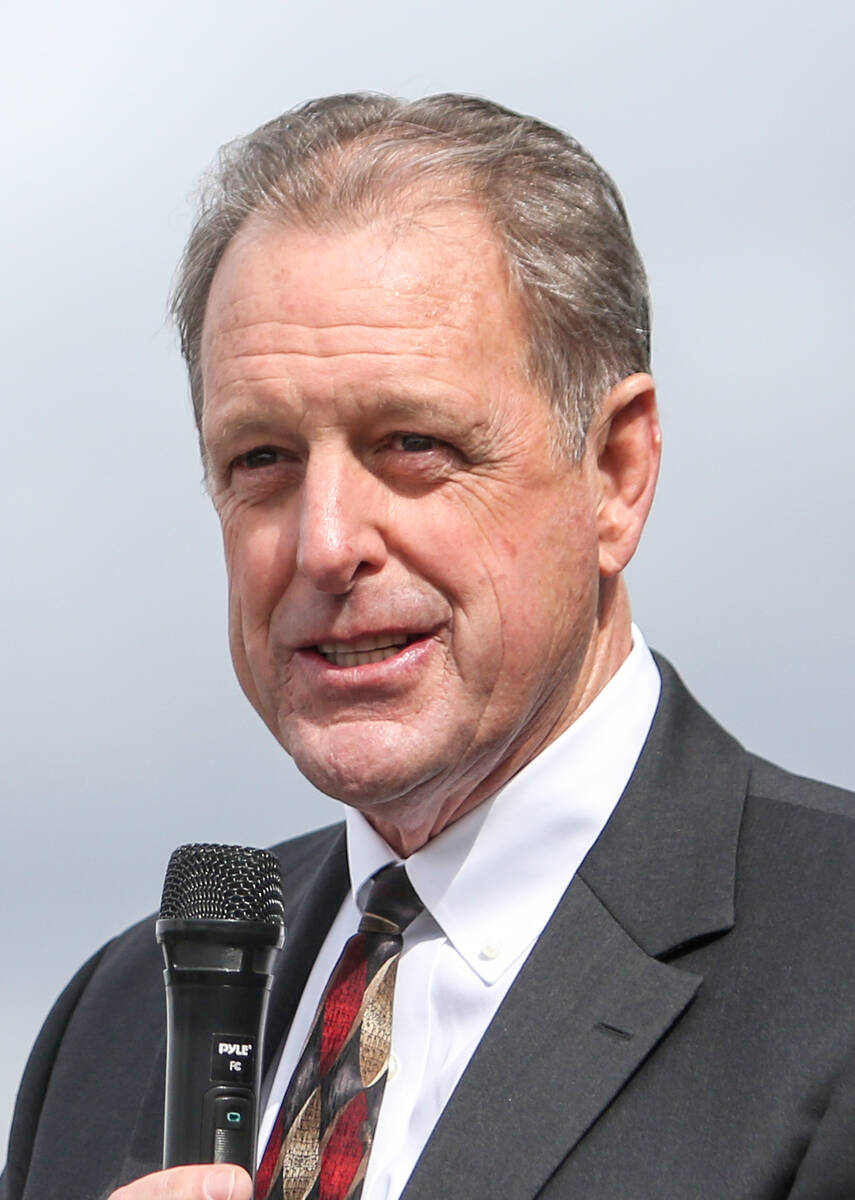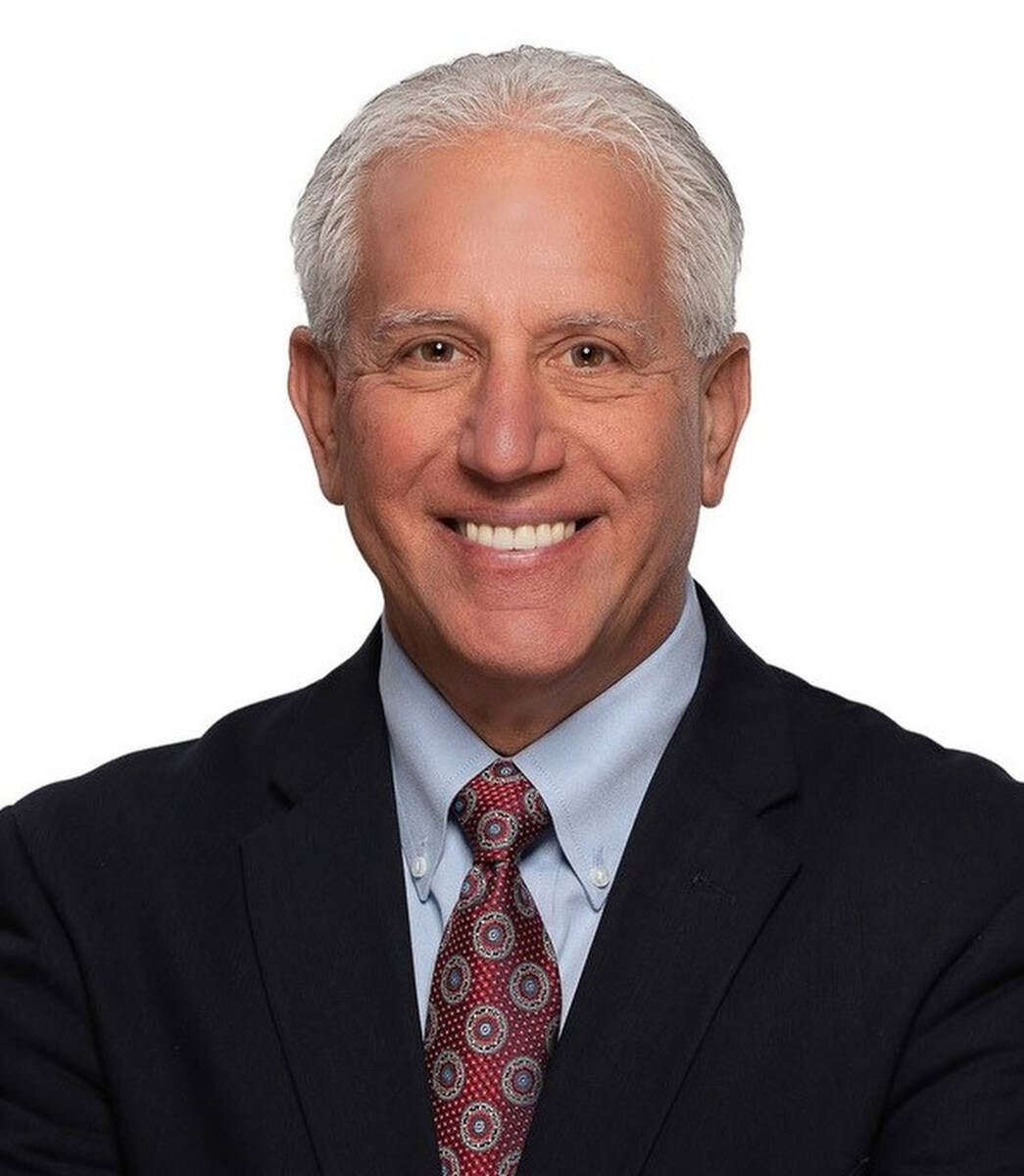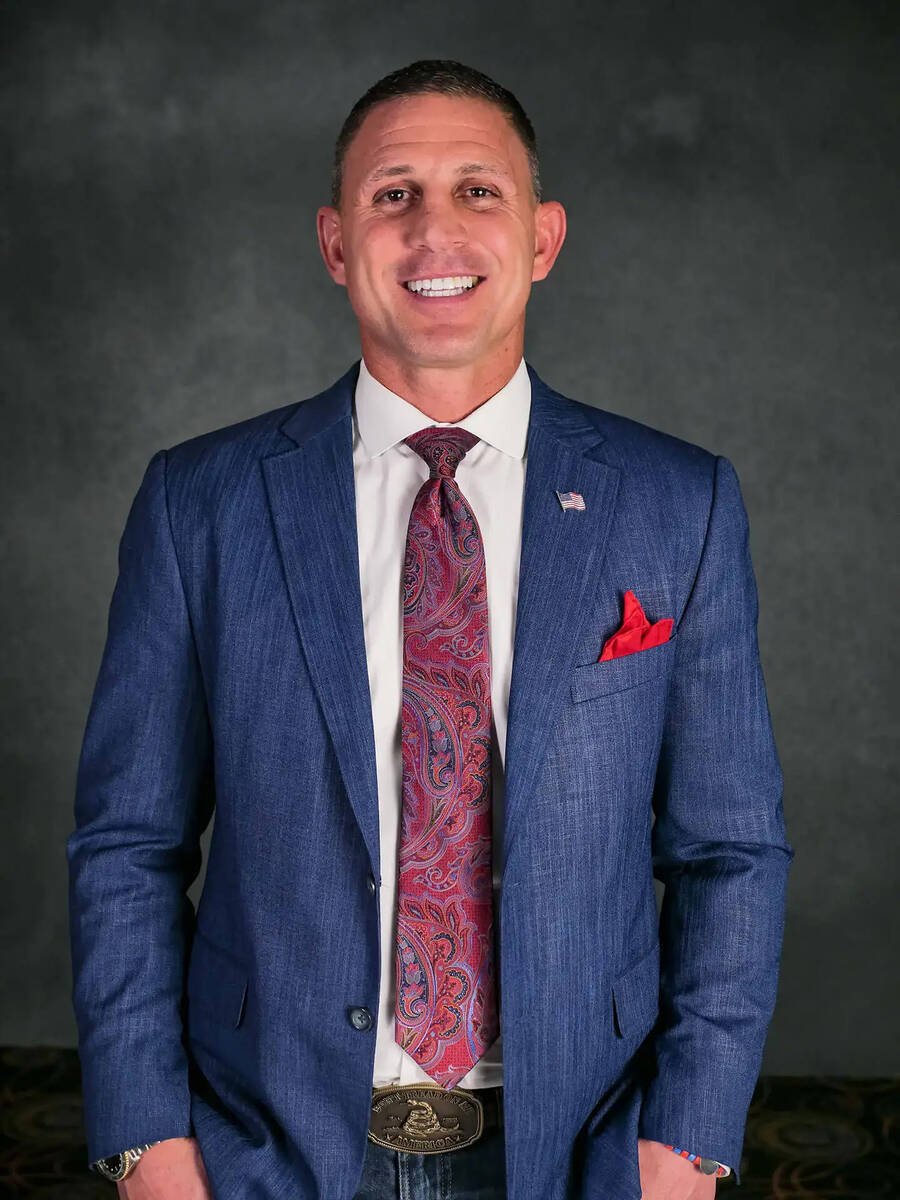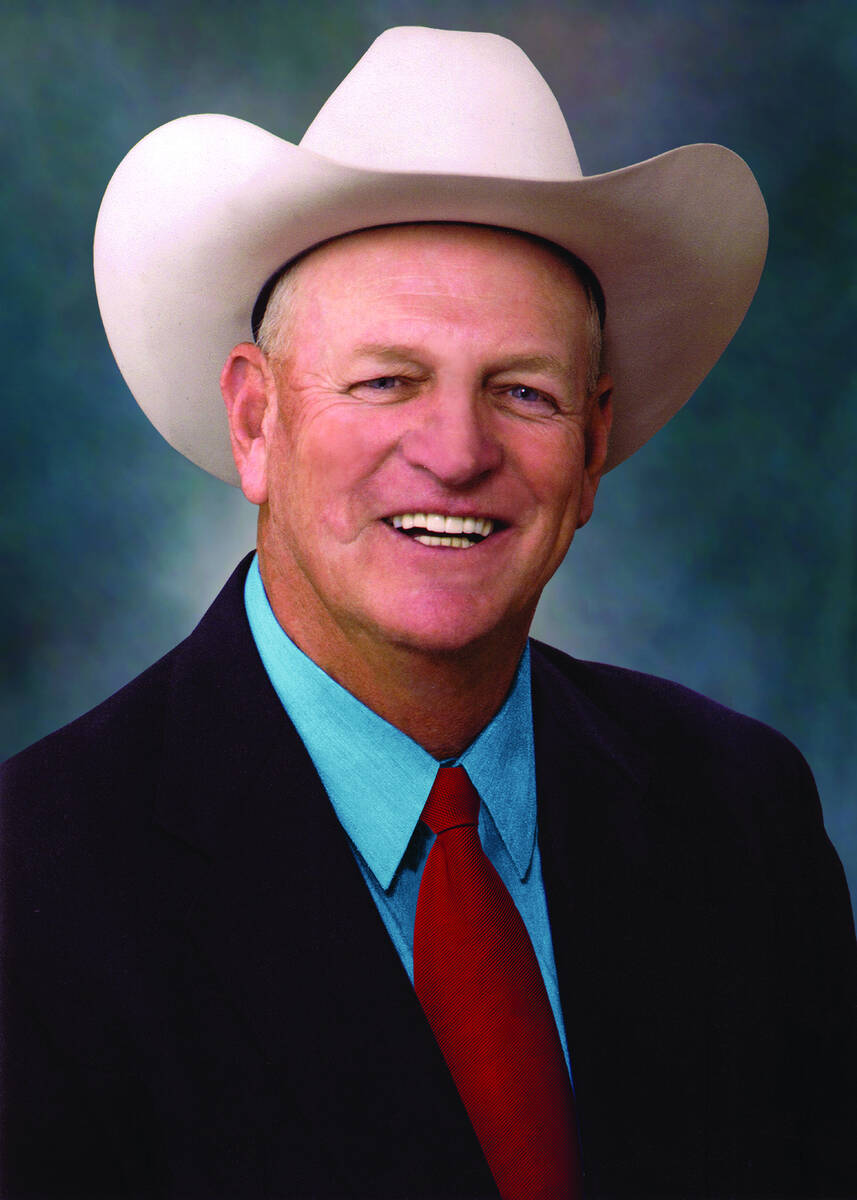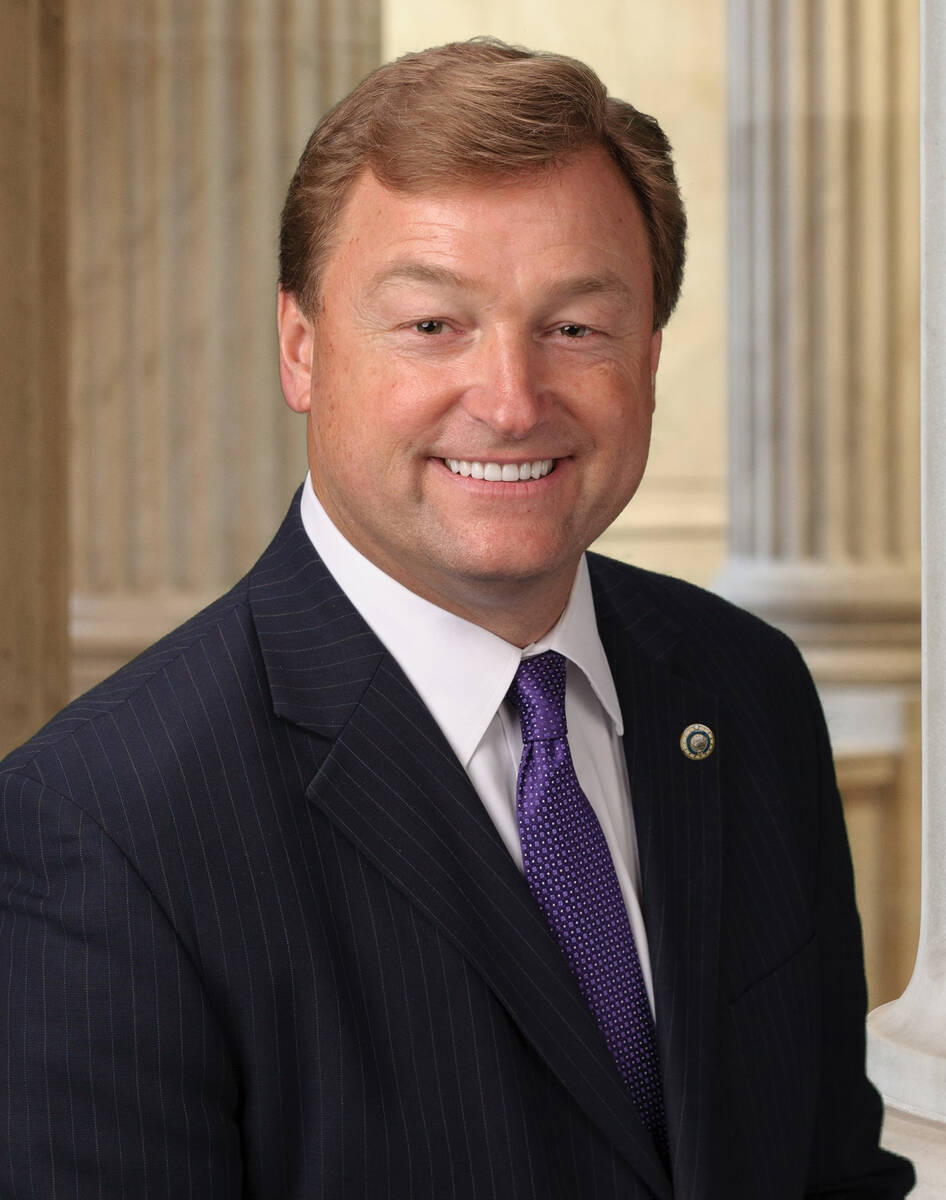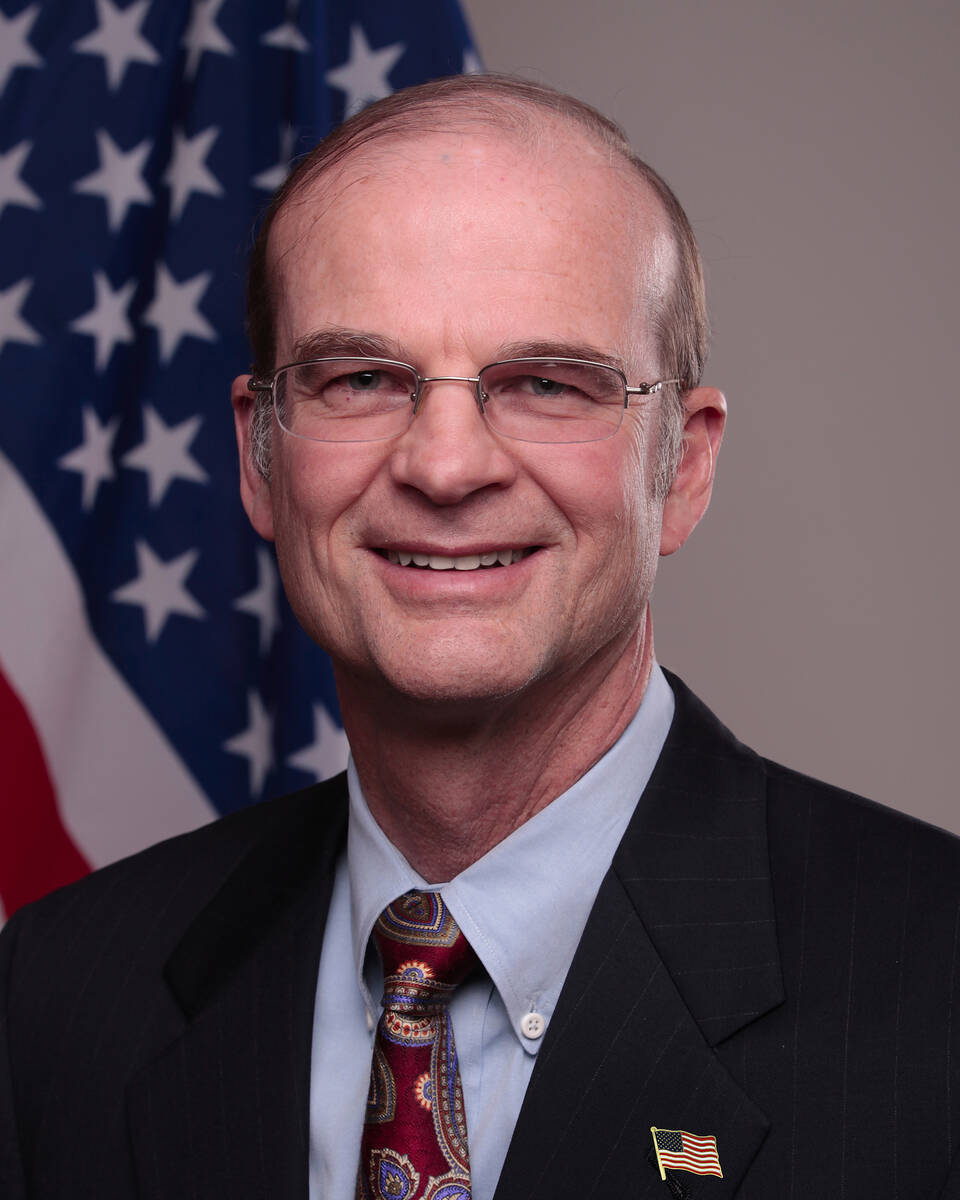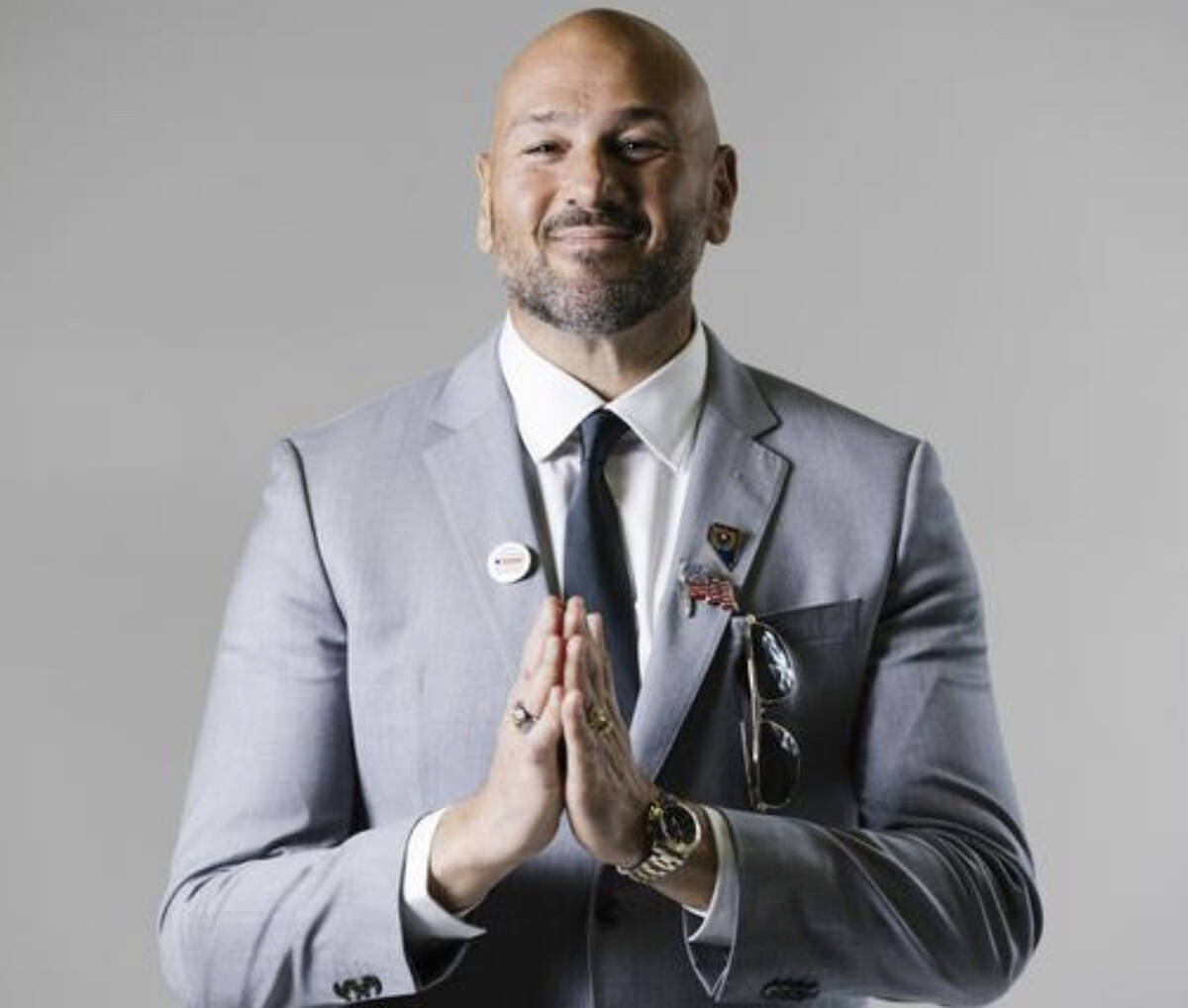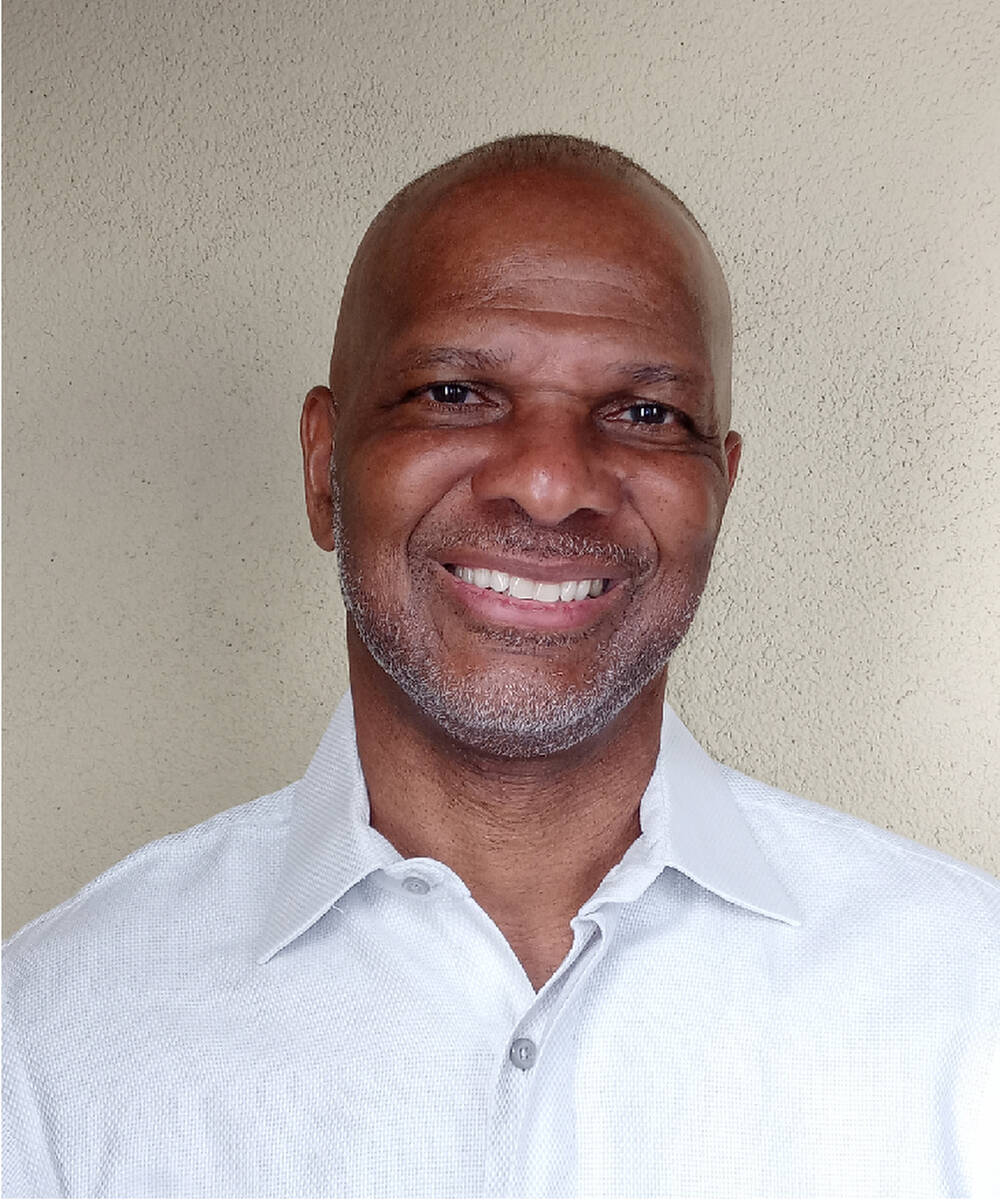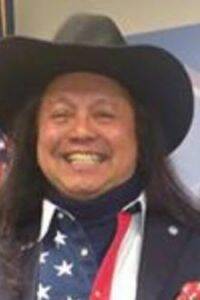Lombardo leads crowded field looking for chance to replace Sisolak
A massive field of challengers looking to unseat Gov. Steve Sisolak will be whittled down in Nevada’s June 14 primary.
In all, 15 Republicans and one Democrat filed to challenge Sisolak as the governor mounts his re-election bid.
In the crowded Republican primary, Clark County Sheriff Joe Lombardo has been viewed as the front-runner since entering the race last summer.
With $3 million in the bank, he’s got a significant cash lead over the field heading into the primary election.
The sheriff, whom his primary opponents have tried to label as a RINO — a Republican in name only — received a significant boost to his conservative credentials last month when he was endorsed by former President Donald Trump.
Other Republicans, including North Las Vegas Mayor John Lee, entrepreneur Guy Nohra and surgeon Dr. Fred Simon, have infused more than $1 million of their own money into their campaign coffers via personal loans.
Despite the nod from Trump, Lombardo was not endorsed by the Nevada Republican Party.
That backing instead went to Reno attorney Joey Gilbert after a vote from the party’s central committee at its convention last month.
On the Democrat side, Sisolak drew a single challenger in former Clark County Commissioner Tom Collins, who reported raising $9,200 as of March 31 and isn’t expected to seriously challenge the governor’s re-election chances.
Democratic primary
Sisolak said in an interview that he wants four more years as the state’s top executive so he can finish the work he started before the COVID-19 pandemic put many of his objectives — including improving education and diversifying the economy — on hold.
On economic development, he said Nevada doesn’t have some of the things other states are offering to businesses looking to move, so he’s focused on selling the state for its low tax rates and good business environment.
He said improving education, and especially workforce development, will be a key to making Nevada more attractive to manufacturing and technology companies that he hopes will help Nevada move away from its economic reliance on gaming and tourism.
“We need to do a better job of training the workforce. We’re not turning out enough engineers and (science, technology, engineering and mathematics) folks,” Sisolak said.
The former Clark County commissioner and university regent recently announced he will use $500 million in federal relief money to fund an affordable housing initiative.
Beyond adding more money, Sisolak said he wants to look at ways of dealing with the hedge funds that have been buying houses across the state and turning them into rental income.
“They’re buying them up sight unseen and have shut out the locals,” he said. “I’m interested in doing something, anything that will open up the options for individuals or families to be able to get into their first homes.”
Sisolak is well aware of the criticism his opponents have thrown his way over how he managed the COVID-19 pandemic, but he mostly brushed them off.
“It’s easy to sit back and play Monday morning quarterback,” Sisolak said. “Their plan is to just criticize what I did. I understand that’s how they think they’ll get elected is by criticizing me.”
Collins, a former Clark County commissioner who also served in the Nevada Assembly, has been a vocal critic of Sisolak on social media.
“I’ve known him quite awhile. He’s a flip-flopper,” Collins said in an interview.
Collins said that to improve the economy, Nevada needs to look at putting a floor on property taxes. The idea has been floated by local governments in Nevada for years as a way of increasing revenues from property taxes that cratered during the Great Recession and have slowly recovered since because of the tax caps that were put in place by the Legislature in 2005 in response to skyrocketing home values.
“That’s millions of dollars that were taken off the table for North Las Vegas to provide higher safety and better roads,” Collins said.
Republican primary
Clark County’s top cop is running because he disagreed with Sisolak’s handling of the pandemic and thinks he can better manage the state as its top executive.
“I believe it’s a seamless transition for me to move into a wider breadth of responsibility as a governor. My opponents, in my opinion, do not have similar such situated experience. And they’ve spent a lot of their career entrenched in bureaucracy, versus solutions and management,” Lombardo said in an interview.
Lombardo said he sees three main issues facing the state: economic diversity, education, and law and order.
On crime, he criticized the “single party rule” of the past two legislative cycles — Democrats have controlled the governor’s mansion and both chambers of the Legislature — and blamed legislation they passed for the recent uptick in crime.
Lombardo specifically pointed to an omnibus criminal justice reform bill passed in 2019, Assembly Bill 236, which raised certain thresholds for drug and theft offenses to trigger felony charges.
His department testified in neutral on the final version of the bill rather than opposing it. Lombardo said that was “because there was some legislation that would be even more detrimental if we didn’t have the spirit of compromise.”
Lombardo said the state needs to focus on bringing in more manufacturing and technology companies and the higher paying jobs that come with those sectors to diversify the economy.
He said education is not an easy fix and that the solutions for Clark County won’t work for Washoe County or the rural parts of the state.
“It’s a little more comprehensive than, ‘Hey, let’s just break up the school district and that’ll be our answer,’ ” Lombardo said.
On affordable housing, he said growing the economy will help but that he wants to look at ways to reduce some of the regulations placed on developers as a way to streamline the approval process for affordable housing projects.
Former senator returns
Heller has had a lengthy political career in Nevada. He was appointed to the U.S. Senate in 2011 and won election the following year. Before that, he served three terms in the House, three terms as Nevada’s secretary of state and two terms in the state Assembly. He lost his U.S. Senate re-election bid in 2018 to Democrat Jacky Rosen.
Heller blamed the business closures and restrictions that Sisolak put in place early in the pandemic for the current state of the economy, which he said is “so stretched and problematic the way it is today.”
“Businesses got crushed. Working families were crushed. Crime went through the roof, and frankly, people were scared,” Heller said.
He criticized Sisolak’s state worker vaccine mandate, as well as Lombardo for implementing a similar mandate for his police department.
Both mandates are no longer in place.
His plan for reshaping the economy includes reducing sales tax in the state by an amount that is proportional to the rate of inflation, and he would look to cut the state’s general fund operating budget by 20 percent.
Heller said he’d also look to repeal the commerce tax signed in 2015 by then-Gov. Brian Sandoval, a Republican, and would do so by executive order if he couldn’t get it through the Legislature.
“I’ll probably get sued,” Heller said. “I want the fight. And then when the courts come to their conclusion, if it’s not favorable, then I’ll take it right back to the voters.”
On affordable housing, Heller said he’d work with the congressional delegation to make sure counties such as Clark and Washoe have greater access to surrounding federal lands so they can continue to build more homes.
Democrat-turned-Republican
Lee was a longtime Democrat but made waves when he switched parties last year to run for governor as a Republican.
He said his experiences in state government, including his 14 years served in the Legislature, running businesses and as mayor of the state’s fourth-largest city mean there would be “no learning curve” should he be elected.
“We need leadership that can hit the ground running when the governor gets sworn in,” Lee said.
Lee said he would focus on bringing in more high-paying manufacturing jobs to Southern Nevada to help diversify the economy away from gaming and tourism, sectors that are hit harder than most others during economic downturns.
It is also important to make sure that the companies that are brought in are not heavy users of water, Lee said.
On affordable housing, Lee pointed to his record in North Las Vegas and said it would be his job as governor to work with the local governments to ensure that they are building enough affordable housing to meet the needs of the workforce.
“We in North Las Vegas recognized that if we’re going to be providing all these jobs for the future, we better have entry-level homes. We’d better have apartments and townhouses where people can move here first, establish themselves, get these better paying jobs we’re bringing and then into home ownership,” Lee said.
Ex-boxer enters primary fight
Joey Gilbert has been one of the most vocal critics of Sisolak’s pandemic policies and his use of emergency powers, and he has filed several lawsuits challenging those policies.
Gilbert is a Reno attorney who has specialized mostly in DUI and drug-related cases, but in April 2020 he represented the Nevada Osteopathic Medical Association in a lawsuit challenging limits on prescribing hydroxychloroquine. The case was dismissed two months later.
Gilbert says Nevada’s biggest concern is education and that he would use the governor’s emergency powers — the same ones Gilbert has criticized Sisolak for using during the pandemic — to take over all 17 school districts in the state.
He said he’d then force the state superintendents and the state Legislature to eliminate certain policies such as restorative discipline.
Gilbert is a supporter of private school vouchers and says they should be fully funded “across the board.”
On improving the state’s economy, he said the state should focus on bringing in advanced manufacturing jobs.
Gilbert said he wants Nevada to move to hand-counting ballots because he doesn’t believe the voting machines are secure. Several rural county election officials, including those in Lyon and Elko, have recently rebuffed pushes from some conservatives trying get the counties to switch to paper ballots, saying that the voting machines are safe and reliable and that moving to paper ballots would be time consuming, expensive and with no guarantee of being more accurate or secure.
Washoe County recently rejected a similar push.
“All I know is that our elections are not secure in my mind,” Gilbert said.
Gilbert was in Washington, D.C., on Jan. 6, 2021, the day rioters forced their way into the U.S. Capitol as Congress was certifying Electoral College votes.
But he said he was in the capital to speak at a rally about “medical tyranny” and only found himself on the Capitol steps as the melee unfolded.
Prescription for reforms
Simon describes himself as a “faith-based, constitutional conservative” and said he was spurred to run for governor after growing frustrated with how Sisolak and other elected officials had managed the pandemic.
“I started to feel like there were more politics involved than there was health care issue,” Simon, a surgeon and business owner from Gardnerville, said in an interview.
Improving education in Nevada is not any sort of quick fix and will take years to make any sort of progress, Simon said. But he added that it “is not about money” and criticized the 2015 commerce tax as ineffective.
“We put more money into a system and we’re worse off than we were,” he said.
Rather than repealing it, though, Simon said he’d like to see the proceeds from that tax go to other social programs instead.
To address affordable housing, Simon said he doesn’t believe in rapid growth development and would look to put a five-year moratorium on development as a way of reducing the number of people who move to Nevada and bringing housing costs down.
Businessman for governor
Venture capitalist and entrepreneur Nohra calls himself a “problem solver” and said he’s running because he is “just not impressed with the governance of the state.”
“And it’s something I want to fix,” Nohra said in an interview.
He said he would lean on his experience as an entrepreneur and business executive when it comes to running the state. He wants to audit every department that reports to the governor’s office, using outside firms, to identify and correct inefficiencies.
“I just want to make sure that the people of the state have the best possible customer service from the government,” Nohra said.
Nohra said addressing affordable housing won’t be easy and he would look to see where other jurisdictions have been successful in addressing the issue in some way, then try to replicate that in Nevada.
“Whatever tools they used, I’m going to look at using here, and that’s how we’re going to be able to address this issue,” he said.
Vet running again
Tom Heck, an Air Force veteran who ran unsuccessfully in Republican U.S. Senate primaries in Nevada in 2016 and 2018, said he wants to “revolutionize” Nevada government by bringing more accountability.
He said he’d push to implement private school vouchers, voter ID and push for a ban on sanctuary cities in Nevada.
Heck said he is “one of those who believe that Trump won,” despite there being no credible evidence of any widespread voter fraud in the 2020 election.
Heck says he is pro-life, thinks the state should pursue nuclear energy options for the future, and wants to “find a way” for the free market to address affordable housing in the state.
“I’m all for free markets, so it’s going to be a challenging issue,” he said.
Other candidates join the fray
Barak Zilberberg, a Las Vegas real estate investor, said he is running in part because of the mask and vaccine mandates that are no longer in place.
“There was a lot of things that shouldn’t have taken place. The measures that have or were put in place were wrong,” said Zilberberg, who noted that he did not get a COVID-19 vaccination.
On education, Zilberberg said, “we need to invest more money into education system across the board” and specifically focus on schools in lower-income areas.
William “Dock” Walls decided to run because “voters need an alternative to the candidates who are extreme left and the extreme right.”
“I’m in the middle and provide common ground and common sense,” Walls said.
He said the first thing Nevada needs to do is “establish irreproachable public safety services,” which he said includes making sure that first responders understand that public safety is the top priority, but followed closely by “customer service.”
Walls dismisses the claims of widespread voter fraud that many of his fellow Republicans have promoted and says he’d like to see the country move on and “ensure that our democracy is protected against acts like those which took place on Jan. 6.”
Eddie Hamilton is a perennial candidate who has ran in nearly every election cycle dating back to 2006, usually with a colorful ballot nickname. This time, he’s dubbing himself “Mr. Fix It Now.”
In an interview, he criticized Sisolak’s handling of the pandemic, calling it “totalitarian.”
If elected, Hamilton said he will become a “militia governor” and described a martial law-like proposal where he would set up a grand jury to investigate debunked claims of voter fraud in the 2020 election.
On water, Hamilton said the state should look at building a waterway to bring water some thousands of miles from Ohio to Lake Mead.
Edward O’Brien, a 29-year-old Pahrump resident who works for Kayo Energy in Las Vegas, said he is running because of “a gut feeling.”
“Everyone has an opinion about what should happen,” he said. “Be the change you wish to see in the world.”
He said water is the biggest concern in Nevada currently, and he would look at desalination plants in California as potential solutions.
Gary Evertsen, 62, is a retired mine worker from Elko who said the top issue facing the state is the economy and that Nevada needs to “get a handle on freeloaders and stuff and put people back to work.”
Evertsen said the state needs to be easier on mining companies and allow them to open up more mines.
Three Republicans who filed for governor — Amber Whitley, Stan Lusak and Seven Achilles Evans — did not agree to interviews before this story was published.
Contact Colton Lochhead at clochhead@reviewjournal.com. Follow @ColtonLochhead on Twitter.



